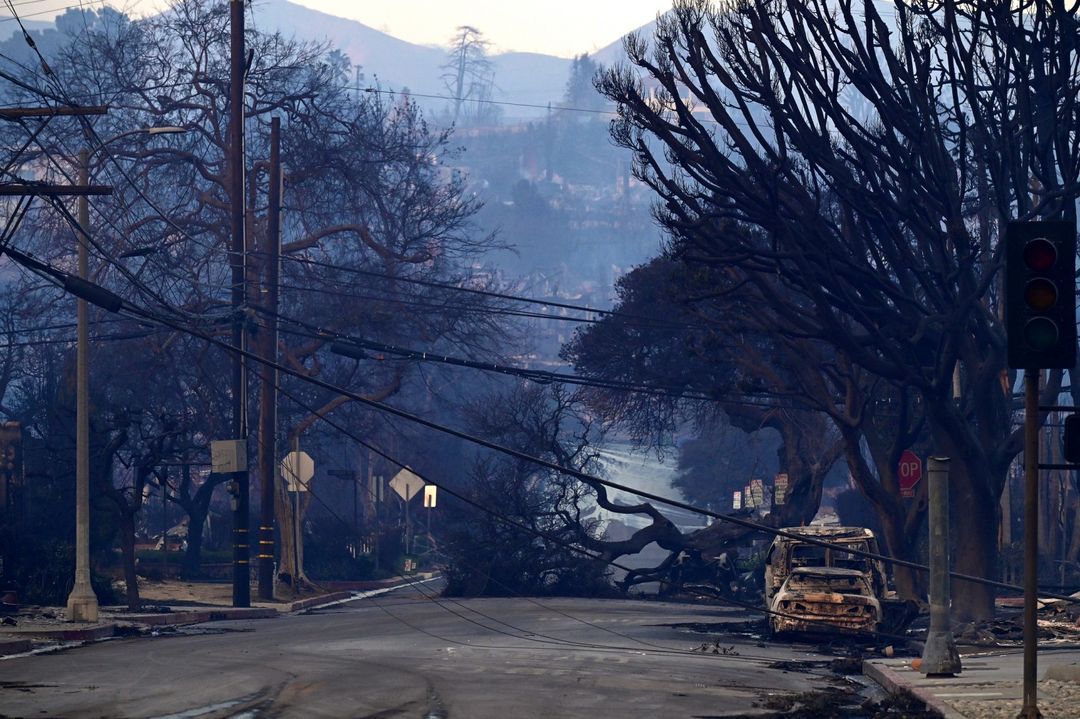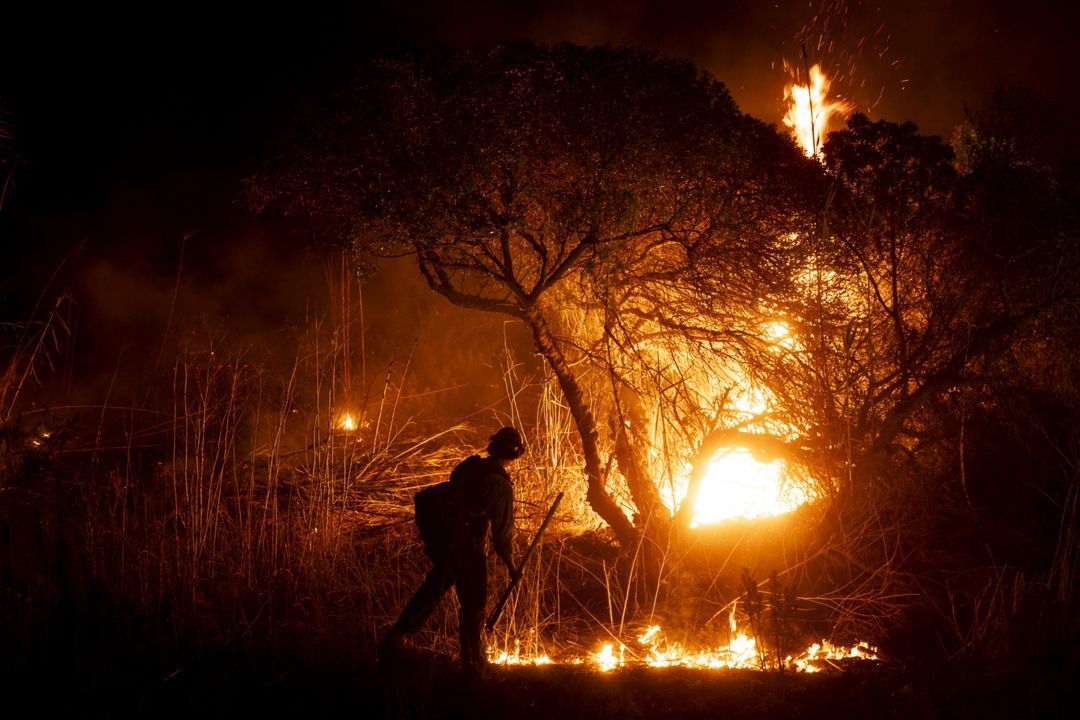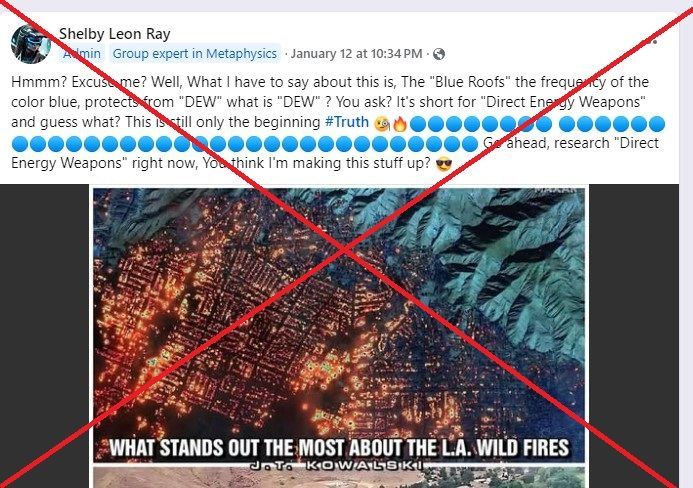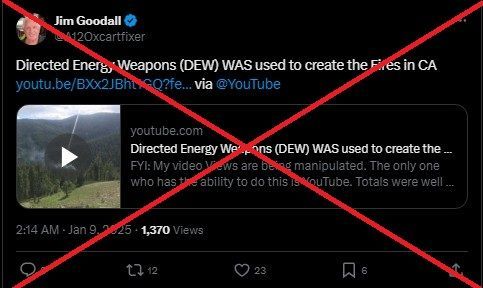“The reason Fire Fighters have Never seen anything like the debris and destruction of the LA Fires (2025) is because > DIRECTED ENERGY WEAPONS (DEW’s) were utilized to assure Maximum Destruction (EVIL !! ),” said a January 11, 2025 Facebook post. “This has already happened to Lahaina, Maui (Hawaii).”
“This is DEW not wild fire… it ain’t natural… Cars are evaporated, yet trees with green,” an X user wrote on January 9.
Similar claims circulated on Instagram, Threads, and Rumble, and in Spanish and French. Some tied the claims to similar debunked theories about the 2023 Maui wildfires, including that homes with certain roof colors were spared, or citing evidence that trees remained standing even as structures and vehicles burned.
The unprecedented wildfires left at least two dozen dead as of January 16, destroyed homes and charred thousands of acres.
No evidence has linked the outbreaks to experimental energy weapons — which are being developed for military use, though they are a target of long-circulating conspiracy theories.
Wildfires have been an issue in the region for years, and the unusually dry conditions and high winds have made these far worse, experts say.
Warnings from the National Weather Service and local government departments anticipated dangerous fire conditions as early as January 7.
“The dry fuel from a lack of rain and extreme winds drive the fires to spread very fast. It doesn’t matter what small spark starts it, because the winds are so high and vegetation is so dry there is nothing firefighters can do so it spreads until the winds die down,” said Michael Gollner, a University of California professor and chair of the Research Advisory Board of the National Fire Protection Agency (NFPA) Fire Protection Research Foundation (archived here). “Obviously directed energy weapons are not very likely.”
Joe McNorton, a scientist at the European Centre for Medium-Range Weather Forecasts (archived here), said in a January 8 statement that the reasons for the fast-moving fires were clear.
“California has experienced very low precipitation through autumn and winter, leaving vegetation — both living and dead — exceptionally dry,” he said. “This dryness, combined with strong offshore winds and high temperatures, created ideal conditions for fires to spread rapidly.”
Media reports said sparks from utility lines may have been a factor in some of the fires.
Energy weapons
Iain Boyd, director of the University of Colorado’s Center for National Security Initiatives (archived here) and an expert on directed energy weapons, referred AFP on January 9 to a research paper on the technology, which has been cited in other debunked claims of intentional fires.
“One key challenge for militaries using high-energy lasers is the high levels of power needed to create useful effects from afar,” Boyd said in his paper.
“The power level needed to ignite vegetation with a high-energy laser from the sky would require a large power source installed on a large aircraft.”
Boyd also noted that videos purporting to show visible beams igniting fires would not be this type of technology.
“In some images that claim to show the fires being started, the laser beams are green. Beams from high-energy lasers are invisible,” he said.
Burning trees
Despite claims that the blazes did not affect certain vegetation, images from AFP (below) and other news organizations showed the destruction of numerous trees.
Forestry experts say some trees may be more resistant to fire because they store moisture. Other factors can also have an effect.
“Trees in fire-prone areas develop thicker bark, in part, because thick bark does not catch fire or burn easily. It also protects the inside of the trunk, the living tissues that transport water and nutrients, from heat damage during high-frequency, low-intensity fires,” the National Forest Foundation says on its website.
The nonprofit Arbor Day Foundation notes that several species of trees are relatively fire-resistant due to their bark, moisture and “a lack of branches low to the ground (that) prevents flames from climbing into the treetops.”
Similar claims about trees being spared circulated during major fires in Hawaii and Canada.
AFP has debunked other false claims related to the Los Angeles wildfires here, here and here.
Author(s): Nahiara S. ALONSO / Rob Lever / AFP USA
Media outlets may republish this fact-check on their official website, provided they accept and comply with the Terms of Use of Home - CEDMO
Originally published here.

![[FACT-CHECK] - Unfounded conspiracies swirl on energy weapon use amid Los Angeles fires](https://mediaconnect.com/wp-content/uploads/2025/01/000_36T6493-ipad-thegem-blog-default.jpg)



